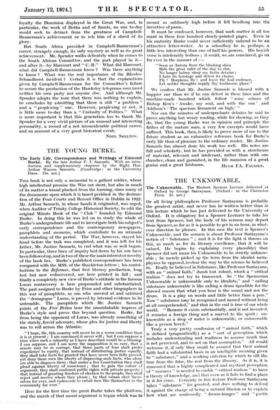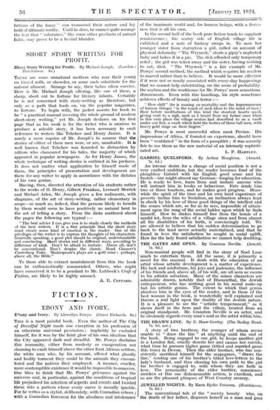THE UNKNOWABLE.
OF all living philosophers Professor Santayana is probably the greatest artist, and never has he written better than in
this lecture which he has just delivered to the University of Oxford. It is obligatory for a Spencer Lecturer to take his text from Spencer, but the body of his sermon may depart from Spencer, as far as it is possible to get in an hour, in what- ever direction he pleases. In this case the text is Spencer's Unknowable, and the sermon is about Professor Santayana's notion of" Substance " ; and it is for the light it throws on this, as much as for its literary excellence, that it will be valued. He begins by explaining (very plausibly) that Spencer did not mean his Unknowable to be strictly unknow- able; he merely picked up the term from the idealist meta- physics he opposed, to clear the way to the science he believed in. Really he believed in Substance, like Professor Santayana, with an "animal faith," dumb but robust, which a "critical realism" does not try to transcend. So "the Spencerian Unknowable is unknowable only to idealists," and "calling substance unknowable is like calling a drum inaudible for the shrewd reason that what you hear is the sound and not the drum. It is a play on words and little better than a pun." Now " substance may be recognized and named without being at all comprehended," and that in the end is true of our whole world. "Because it exists substantially, and is not invented, it remains a foreign thing and a marvel to the spirit : un- knowable as a drop of water is unknowable, or unknowable like a person loved."
Truly a very pretty confession of "animal faith," which is defined (pragmatically) as a "sort of perception which includes understanding and readiness to assume much that is not perceived, and to act on that assumption." All would welcome it, if only they could be assured that their animal faith had a substantial basis in an intelligible meaning given to "substance," and a working criterion by which to sift the true from the false, the real from the illusory. As it is, it is rumoured that a highly complicated and mystical perception of " essences" is needed to enable "critical realism" to have a theory of knowledge, and that even so it fails to find a place in it for error. Certainly in this lecture Professor Santayana takes " substance " for granted, and does nothing to defen4 it against the charge of being a natural illusion or to explain how what are confessedly " dream-images" and "poetic
fictions of the fancy" can transcend their nature and lay hold of ultimate reality. Until he does, he cannot quite assuage the fear that "substance," like some other products of animal faith, may prove to be a bestial blunder.







































 Previous page
Previous page